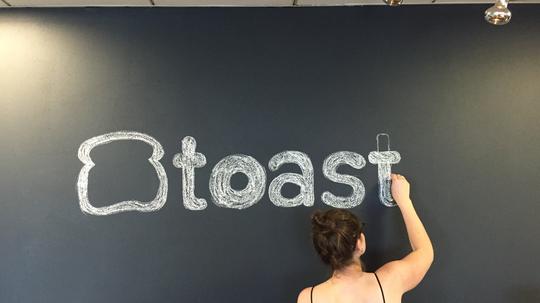
We’ve all been there. You had a great meal over a business meeting and now you have to get back to the office for a few more calls before your spinning class starts — but for some reason, that restaurant bill is taking its sweet time getting here. What’s worse, when it arrives, your guest awkwardly insists she will pay for her own meal, so now you have to do a line-item account of who had what. “Damn all those small plates,” you think to yourself.
“We want to grow as fast as possible because it’s a huge market."
This is a time-sucking headache not only for you and the pen-and-paper wielding waitress, but also for the restaurant owner, who is losing precious time in serving more customers.
As a growing number of startups have taken over this space to make everyone’s lives easier with their own mobile- and cloud-based restaurant tablet solutions, Boston restaurant software startup Toast Inc. recently came out of its shell to show that it’s becoming a serious contender. (It’s even holding an open house next week to show off its new office space.)
In a press release last month announcing that it had reached 1,000 customers within two years, Toast called itself “the fastest growing restaurant technology platform company.” That’s quite the claim. But other recent milestones show that Toast is experiencing aggressive growth with its all-in-one POS and restaurant management software.
Among those milestones, Toast recently reached around 140 employees and plans to add more than 15 new employees every month, according to Ellie Mirman, Toast’s vice president of marketing. The company also recently upgraded its space, going from 7,000 square feet in Cambridge to 40,000 square feet at the new Hatch Fenway co-working space, giving it the capacity to more than double its workforce to 250, possibly within the next year, Mirman added. That’s a far cry from the 15 or so employees it had at the beginning of 2014.
On the funding side, Toast recently disclosed that it raised nearly $3 million in debt financing from five unnamed investors and that it’s looking to raise an additional $15 million. The company, which had raised about $7 million before the most recent deal, is declining to speak about the funding for now, but Toast CEO Chris Comparato told BetaBoston in July that it had been planning a “significant second round” later this year.
The company has been focusing most of its energy on delivering a solid product in the past two years, Mirman said; now it's making a bigger push on the sales and marketing side.
“We want to grow as fast as possible because it’s a huge market,” Mirman said. And she’s right, the market is huge, with more than 630,964 establishments counted last year, according to The NPD Group.
Founded in 2012, Toast initially started with a mobile payments app for restaurants a year later, but the company quickly started to realize that restaurants had far more needs than just being able to accept payments using a phone or tablet. Currently, local spots like Mei Mei Street Kitchen, Allston Diner, Fresh City and Finale, among other, are using Toast's platform.
That’s why the company has since grown its software to a full restaurant technology platform, with solutions for POS, online ordering, gift cards, analytics and other features, which Mirman said can allow restaurants to replace six or more vendors, offering significant cost and time savings.
Watch: Mei Mei Street Kitchen's founder talks about using Toast's technology.
“Toast's POS platform was built specifically for the restaurant industry so that owners and operators can take advantage of cloud-based, mobile technology,” Mirman said. “Restaurant operations can be complex — whether it's integrating online orders with in-store orders, managing the kitchen prep workflow, or handling employee permissions — and Toast offers the depth of functionality to handle the complex restaurant environment.”
Toast appears to be on a good path, offering an Android-based system that allows restaurants to use a variety of different devices that can be updated in a short period of time. An analysis by Grand View Research earlier this year shows that cloud-based systems, like the one used by Toast, is estimated to drive POS terminals market growth over the next few years. The only warning the analysis gives is the security concerns that come with any computer system.
But Mirman said that can be a strength for cloud-based systems like Toast, pushing more restaurants and other establishments to leave legacy equipment behind.
“There are a couple of security challenges when it comes to on-premise POS systems — they have a server on-site with critical credit card data, which can be stolen, and those systems are infrequent (and expensive) to update,” she said. “That means that when there is a security loophole uncovered, these old systems become vulnerable for an extended period of time. Contrast that with a cloud-based system — where you can encrypt any sensitive data immediately and send it to the cloud over a secure network. Then, if there are any changes in the industry — security concerns or updates required — it's simple (and with Toast, free) to update that software.”
Images provided.








